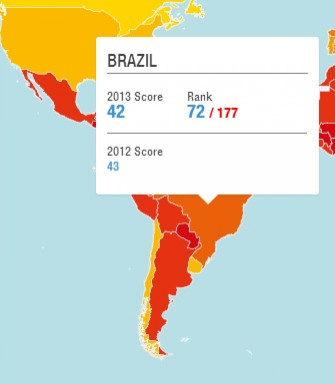NGO Names Uruguay Most Transparent Country In Latin America, Venezuela Most Corrupt

Latin America's rating for corruption remains little changed from last year, according to the German nongovernmental organization, or NGO, Transparency International, which released its 2013 Corruption Index on Tuesday.
Uruguay ranks 19th out of 177 countries with a score of 73 (where 0 is highly corrupt and 100 is highly clean), making it the most transparent country in the region. It is closely followed by Chile (score 71, position 22), and then by Puerto Rico (score 62, position 33) and Costa Rica (score 53, position 49).
At the other end of the scale, the worst-faring Latin country is Venezuela, with a score of 20 and a rank of 160. Paraguay (score 24, position 150), Honduras (score 26, position 140), Nicaragua (score 28, position 127) and Guatemala (score 29, position 123) also crowd the back of the line.
In general, Central American countries suffered a setback in their scores, with most of them losing several points compared to last year. Drug trafficking was mentioned as the main cause, since cartels need corrupt officials and institutions to prosper.
Key players on the continent occupied middling positions, like Peru (score 38, position 83) and Colombia (score 36, position 94). The two largest economies in the region repeated positions from last year, Mexico at 106 with a score of 34 and Brazil at 72 with a score of 42.
Alejandro Salas, regional director for Transparency International America, told Spanish news agency EFE that it was a “disappointment” to see both Mexico and Brazil stuck in their positions, but he held some hope for Brazil. “With all the movement that has been in Brazil this year, I expect an improvement in score in years to come.”
The big surprise in this year’s index was Ecuador, which defied the stagnation of the region by raising its score by four points from 2012. The advance was credited to the government's anti-corruption plan and a raise in salary for police. Nevertheless, Salas warned against the risk of depending on the “severity” of one governor as opposed to launching fundamental reforms, and he criticized certain measures, like the closing of several Ecuadorian radio stations and prosecution of the director of national newspaper El Universal on charges of defamation.
At the global level, Afghanistan, Somalia and North Korea tie at the bottom position with a score of 8. On the other side of the spectrum, Denmark and New Zealand took the title of most transparent countries in the world with a score of 91. The U.S. maintained its 2012 score of 73, which put it in the 19th position.
© Copyright IBTimes 2024. All rights reserved.





















